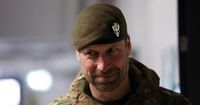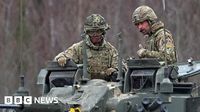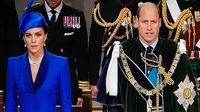Prince William, the heir to the British throne, showcased his commitment to military support for NATO by engaging with troops stationed in Estonia on March 21, 2025. This visit not only emphasized Britain's active role in international defense strategies but also underscored a continuous alliance with European partners in light of escalating geopolitical tensions.
During his visit to the Tapa camp, about 200 kilometers (125 miles) from the Russian border, Prince William donned full military fatigues and participated in various activities designed to highlight the skills and readiness of British forces. The prince inspected infantry fighting vehicles, rode on a tank, and observed a trench clearance exercise, demonstrating both the operational capabilities of the troops and his support for their efforts.
Britain currently has approximately 900 troops deployed in Estonia and Poland as part of 'Operation Cabrit.' This mission represents the UK’s contribution to NATO’s eastern flank, a response ignited by Russia's recent military actions and ongoing tensions in the region. William expressed his dedication to the troops, stating, “From field training to weapon systems operation, this deployment is key! So brilliant to see the dedication and expertise of our troops in action,” in a post shared by his Kensington Palace office on X.
The actions taken during this visit also included overseeing a handover ceremony from the Royal Dragoon Guards, who recently completed their deployment, to the Mercian Regiment, poised to take over for the next six months. In this capacity, William serves as Colonel-in-Chief of the Mercian Regiment, reinforcing the connection between the royal family and the armed forces.
This two-day visit holds symbolic significance as it marks Prince William’s first trip to Estonia. Remarkably, he had previously visited British soldiers in Poland two years ago, aimed at boosting morale and offering support to those engaged in helping Ukraine amidst its ongoing conflict. As tensions rise in Europe, visits like these are crucial for maintaining public and military morale and demonstrate the country’s commitment to its defense obligations.
Alongside military engagements, international diplomacy remains paramount. On the same day of William’s visit, the governments of Germany, France, and Britain collectively issued a joint statement calling for an immediate ceasefire in Gaza. Their assertion pointed out the urgent necessity for Israel to restore humanitarian access, reflecting the broader implications of military engagements beyond mere troop presence.
As NATO ramps up defense strategies across Eastern Europe, Prince William's direct involvement signifies a commitment that transcends ceremonial duties. It portrays the UK as a proactive player in global security dialogues, particularly in relation to its NATO allies. The visit also serves to bolster the reputation of the British military, reinforcing the nation’s resolve in maintaining security and stability amidst adversity.
Military deployments like 'Operation Cabrit' not only signify strategic positioning but also the human stories attached to those who serve. William’s engagement with the troops focuses not only on operational readiness but also on their emotional and mental wellbeing. He aimed to learn about the support systems in place for soldiers, highlighting the importance of mental health in the armed forces.
This emphasis on welfare comes at a time when increasing pressures are being placed on military personnel, prompting a call for enhanced support systems to address emotional and psychological challenges faced during such deployments. The prince’s visit is significant in promoting awareness around these issues, strengthening the bond between the British military and its leadership.
In conclusion, Prince William’s visit to Estonia underlines a multifaceted commitment to NATO operations, reflecting both a military and humanitarian perspective. It highlights Britain's role not just as a participant in global security frameworks, but as a compassionate leader invested in the welfare of its armed forces. As tensions continue to shape the security landscape in Eastern Europe, voices like that of Prince William resonate deeply, carrying the weight of responsibility that comes with such ceremonial roles.



